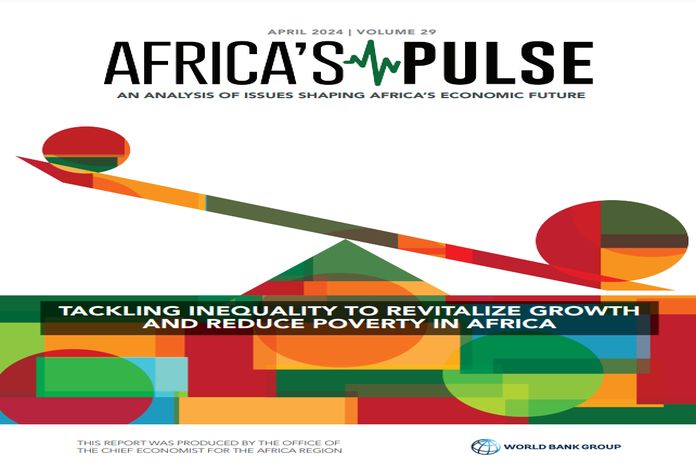– Faster and more equitable growth needed to reduce poverty
WASHINGTON, USA – Increased private consumption and declining inflation are supporting an economic rebound in Sub-Saharan Africa. However, the recovery remains fragile due to uncertain global economic conditions, growing debt service obligations, frequent natural disasters, and escalating conflict and violence, according to the World Bank’s latest Africa’s Pulse report. Transformative policies are needed to address deep-rooted inequality to sustain long-term growth and effectively reduce poverty.
The report projects that growth will rebound in 2024, rising from a low of 2.6 percent in 2023 to 3.4 percent in 2024, and 3.8 percent in 2025. However, this recovery remains tenuous. While inflation is cooling across most economies, falling from a median of 7.1 to 5.1 percent in 2024, it remains high compared to pre-COVID-19 pandemic levels. Additionally, while growth of public debt is slowing, more than half of African governments grapple with external liquidity problems, and face unsustainable debt burdens.
Overall, the report underscores that despite the projected boost in growth, the pace of economic expansion in the region remains below the growth rate of the previous decade (2000-2014) and is insufficient to have a significant effect on poverty reduction. Moreover, due to multiple factors including structural inequality, economic growth reduces poverty in Sub-Saharan Africa less than in other regions.
“Per capita GDP growth of 1 percent is associated with a reduction in the extreme poverty rate of only about 1 percent in the region, compared to 2.5 percent on average in the rest of the world,” said Andrew Dabalen, World Bank chief economist for Africa. “In a context of constrained government budgets, faster poverty reduction will not be achieved through fiscal policy alone. It needs to be supported by policies that expand the productive capacity of the private sector to create more and better jobs for all segments of society.”
The report highlights that external resources to meet gross financing needs of African governments are shrinking and those available are costlier than they were prior to the pandemic. Political instability and geopolitical tensions weigh on economic activity and may constrain access to food for an estimated 105 million people at risk of food insecurity due to conflict and climate shocks. African governments’ fiscal positions remain vulnerable to global economic disruptions, necessitating policy actions to build buffers to prevent or cope with future shocks.
What’s more, inequality in Sub-Saharan Africa remains one of the highest in the world, second only to the Latin America and Caribbean region, as measured by the region’s average Gini coefficient. Access to basic services, such as schooling or healthcare, remains highly unequal despite recent improvements. Disparities also exist in access to markets and income-generating activities, irrespective of people’s skills. Taxes and poorly targeted subsidies may also have an outsized impact on the poor.
“Inequality in Africa is largely due to the circumstances in which a child is born and accentuated later in life by obstacles to participating productively in markets and regressive fiscal policies,” said Gabriela Inchauste co-author of a forthcoming World Bank report on tackling inequality in Sub-Saharan Africa. “Identifying and better addressing these structural constraints across the economy offers a road map for a more prosperous future.”
Africa’s Pulse calls for several policy actions to foster stronger and more equitable growth. These include restoring macroeconomic stability, promoting inter-generational mobility, supporting market access, and ensuring that fiscal policies do not overburden the poor.





